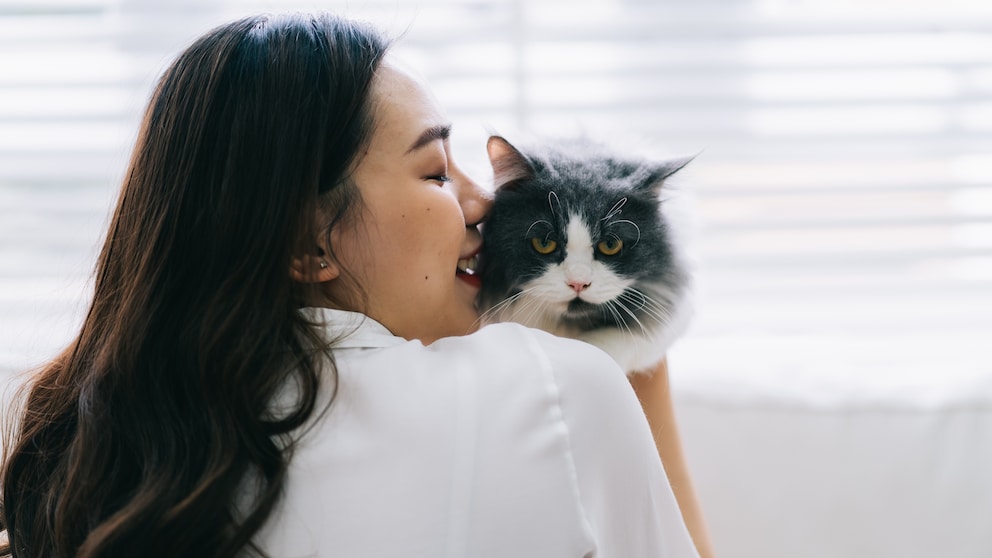August 21, 2024, 9:58 am | Read time: 4 minutes
Cats often show very clearly when they like or dislike certain people. If the animal hisses and swings its paw, there are usually good reasons for this. PETBOOK explains what you can do and how to repair the bond with your pet.
Naturally, as a cat owner, you want to establish a strong bond with your pet. But sometimes it seems as if our pets don’t like us (anymore). There can be various reasons why the relationship with your cat may have deteriorated. However, cats usually show pretty clearly when they are not well-disposed towards us. There are then sure signs and 13 behaviors to watch out for. This article will explore how to prevent your cat from disliking you and how to build and maintain a strong bond.
Cats are very social creatures
Contrary to what some may believe, cats are social animals that form complex bonds with their owners. The stereotype of the independent and solitary cat that regards people as mere staff is simply a myth.
Krystin Vitale Shreve, an animal behavior researcher at Oregon State University, has spent years investigating what cats genuinely enjoy and what they prefer to avoid. Back in 2017, she and her colleagues found in a study that they preferred interaction with a human to toys or food.
Two years later, the cat researcher found in another study that cats react to our behavior. It depends on how we approach the animals. If we suddenly ignore them and change our behavior, they no longer want to know anything about us. However, the animals also reflect our behavior when we initiate contact. To this end, the scientists studied 23 cats with owners and 23 animals that had to live in an animal shelter. If the people stroked the cat, called it by name, and talked to it, the animals were happy to give them attention.
Cats from animal shelters need more attention
In the 2019 study, Krystin Vitale Shreve and her colleagues also found a difference between cats that have a home and those that live in a shelter. The study notes that a cat’s living environment can influence its sociability, whether at home or in a shelter. During the study, shelter cats spent more time with humans than animals with a permanent home.
The study suggests that the animals appreciate our attention and become more affectionate rather than more distant when they live temporarily in a shelter without sufficient contact. Thus, they desire companionship with us, underscoring their inherently social nature.
These 13 signs cats show when they don’t like their owners
The research results indicated that domestic cats recognize the attention state of humans and adapt their behavior accordingly. This demonstrates their sensitivity to human social cues and their tendency to be more social in the presence of an attentive human.
However, cats usually also have specific reasons for not liking some people or having a bad attitude towards their owners. This is easily recognized by the means of communication available to the cat. You should look out for the following behaviors, which often occur suddenly and change:
When an animal is really scared or perhaps even in pain, it will exhibit behaviors 8 to 13.
Why does the cat suddenly no longer like me?
There can be several reasons cats change their behavior and display the behaviors described above, most of which have to do with changes. The animals often show defensive behavior if you have acquired a second cat or a dog.
Also, if you have a new job and come home at different times or later than usual, this confuses the cat and upsets its routine. In addition, changes in your living situation, such as a new roommate, partner, or the birth of a child, can also lead to the animals no longer being happy and balanced.
Changes in the territory of free-roaming cats can also lead to a bad mood among the animals. Perhaps a new tomcat who wants to prove himself has appeared in the territory and is bullying the resident cat. As the owner, you should be particularly vigilant and regularly check the animal for injuries. If the cat refuses to go outside because of this change, it should at least be allowed to enjoy the sun on the balcony or terrace.

How to Tell If Your Cat Likes You

Merely employees and can openers? How do our cats see us

Animals also mourn the loss of their own kind
How can you repair your relationship with your cat?
However, animals may also exhibit signs of discomfort even in the absence of direct environmental changes. This is primarily because they are bored or not being kept busy. To (re)forge a strong bond with your cat, consider the following:
Following these tips, your cat should soon return to feeling comfortable and content. However, if the signs do not disappear, an undetected illness may be causing the animal discomfort. A visit to the veterinarian can help clarify if an undetected disease is the cause.

